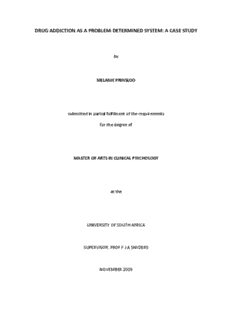Table Of ContentDRUG ADDICTION AS A PROBLEM-DETERMINED SYSTEM: A CASE STUDY
by
MELANIE PRINSLOO
submitted in partial fulfilment of the requirements
for the degree of
MASTER OF ARTS IN CLINICAL PSYCHOLOGY
at the
UNIVERSITY OF SOUTH AFRICA
SUPERVISOR: PROF F J A SNYDERS
NOVEMBER 2009
DECLARATION OF OWN WORK
“I declare that DRUG ADDICTION AS A PROBLEM-DETERMINED SYSTEM: A CASE STUDY, is
my own work, and that all the sources I have used or quoted have been indicated and
acknowledged by means of complete references.”
................................................. .................................................
Melanie Prinsloo Date
Student Number: 41918193
i
ABSTRACT
The purpose of this study was to gain a better understanding of how a problem-determined
system developed around a case of drug addiction within the context of a system of
relatedness. The epistemological framework informing this qualitative study was
constructivism. The six participants who took part in the study represent the most
prominent role players in the particular context of living. The individual battling with drug
addiction, his parents, older sister, maternal grandmother and maternal aunt were
interviewed. The methods of data collection employed were semi-structured interviews, a
family-chronological event chart, genograms, and an eco-map. The interviews were
interpreted using the hermeneutic approach. The different themes that emerged from each
participant’s story were integrated in relation to each other and with respect to the
collaborative sources of data. The most dominant themes extracted within this study are
the initial reactions to Andrew’s drug addiction, life changes experienced due to Andrew’s
drug addiction, support, as well as the meanings attributed to Andrew’s drug addiction.
Further research into problem-determined systems in different cultures is recommended.
Keywords: Problem-determined system, drug addiction, system of relatedness, context,
family.
ii
ACKNOWLEDGEMENTS
It is with heartfelt gratitude that I wish to acknowledge the following individuals, without
whose unwavering devotion, support and contribution the completion of this dissertation
would not have been possible:
To my supervisor, Professor Ricky Snyders, thank you for sharing your knowledge, wisdom
and insights with me, as well as surrendering hours of your time to assist me in seeing this
project through to the end. Your guidance, support and never-ending patience are sincerely
appreciated.
To the six participants who wholeheartedly agreed to be part of this study, thank you for
being brave enough to share your personal stories with me, and in so doing, assist in
different ways to help those who may suffer the same fate in the future.
To my wonderful husband, Kobus, thank you for believing in me, constantly supporting me
and holding my hand every step of the way along this long and difficult journey.
To my phenomenal parents (Riaan and Annetjie) and in-laws (Gerrit and Marie), words
cannot express how much I appreciate all that you have done and sacrificed in helping me to
complete this journey. Thank you for your unconditional love and continuous support.
iii
A special thanks to my editor, Dr Anna-Mart Bonthuys, without your expertise this
dissertation could not have come together in such a meaningful whole.
To my two best friends, Hayley and Ilse, thank you for your constant support and the many
words of encouragement and motivation during the writing of this dissertation.
I sincerely thank you all.
Melanie Prinsloo
iv
TABLE OF CONTENTS
Page
Declaration of own work i
Abstract ii
Acknowledgements iii
CHAPTER ONE: INTRODUCTION 1
Introduction and orientation 1
Formulation of the research topic 4
Aim and rationale of the study 8
Structure of the study 11
CHAPTER TWO: THEORETICAL FOUNDATION AND RESEARCH REVIEW 12
Introduction 12
Eco-systemic approach 13
General systems theory 14
Cybernetics 16
Family systems theory 22
Modernist contributors to family systems theory 23
Postmodern contributors to family systems theory 29
v
Related research 31
Perception of drug addiction 34
Drug abuse in South Africa 35
Summary 36
CHAPTER THREE: RESEARCH DESIGN 37
Introduction 37
Selected ontology 38
Selected epistemology 39
Qualitative research approach 43
Sampling and selection 44
Method: A case study 45
Collection of data 46
Focus of the interviews 50
Analysis of the interviews 52
Hermeneutic process of analysis 52
Integration of data 54
Role of the researcher 54
Reliability and validity 56
Ethical considerations 57
Summary 59
vi
CHAPTER FOUR: RESULTS 60
Introduction 60
Themes 64
Collaborative data 68
Familiarisation 68
Genograms 72
Ecological considerations 79
Family chronology 83
Presentation of themes 85
Theme one: Initial reactions to Andrew’s drug addiction 86
Theme two: Life changes experienced due to Andrew’s drug addiction 90
Theme three: Support 95
Theme four: Meaning attributed to Andrew’s drug addiction 99
Integration of results 102
Theme one: Initial reactions to Andrew’s drug addiction 102
Theme two: Life changes experienced due to Andrews drug addiction 105
Theme three: Support 112
Theme four: Meaning attributed to Andrew’s drug addiction 119
Summary 127
vii
CHAPTER FIVE: EVALUATION AND CONCLUSION 135
Evaluation of the study 135
Limitations of the study 142
Recommendations for further research 143
Conclusion 144
BIBLIOGRAPHY 146
viii
APPENDICES
Page
Appendix A: Consent form 151
Appendix B: Semi-structured interview layout 157
ix
Description:A question one may ask would be, for instance: Which feedback processes were set about as a result of Andrew’s drug addiction. Table 4.4 (on page 93)

